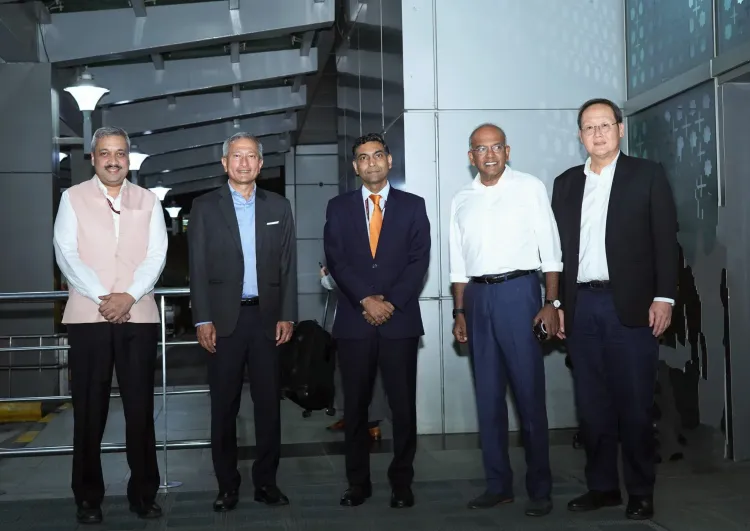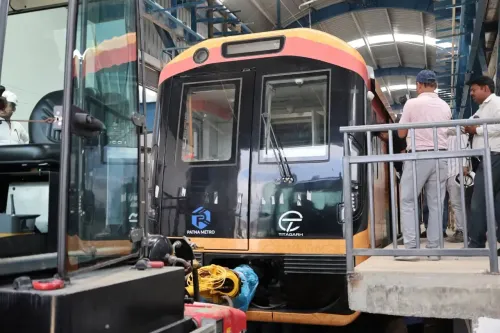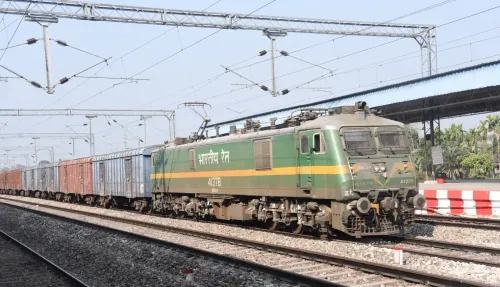How are India and Singapore Strengthening Ties Amid Global Uncertainties?

Synopsis
Key Takeaways
- Strengthening economic ties through strategic partnerships.
- Focus on technological advancements to enhance resilience.
- Collaboration on sustainable growth initiatives.
- Digital integration to facilitate cross-border trade.
- Support for regional stability through cooperative efforts.
New Delhi, Aug 13 (NationPress) The partnership between India and Singapore is evolving into a profound collaboration, where New Delhi is reshaping its diplomatic strategies to fulfill distinct economic and strategic objectives in today’s unpredictable global landscape.
In an era marked by fragile supply chains, unpredictable trade regulations, and environmental challenges, India is committed to enhancing its foreign economic policies with reliable, capable, and strategically positioned allies—and Singapore plays a pivotal role in this initiative, as highlighted in an article from India Narrative.
The Third India–Singapore Ministerial Roundtable (ISMR), taking place here, is set to inject new energy into the relationship. This meeting will convene Indian ministers Dr. S. Jaishankar, Nirmala Sitharaman, Ashwini Vaishnaw, and Piyush Goyal alongside a high-ranking delegation from Singapore led by Deputy Prime Minister Gan Kim Yong and Foreign Affairs Minister Vivian Balakrishnan. This distinctive forum, which commenced in 2022, aims to outline the next stages of collaboration under the Comprehensive Strategic Partnership—pinpointing tangible pathways to expand and enhance bilateral relations.
India and Singapore are collaboratively focusing on areas such as semiconductors, green infrastructure, digital integration, advanced manufacturing, healthcare innovation, and maritime connectivity. Their partnership was further solidified in 2024 with the establishment of the Comprehensive Strategic Partnership. For India, integrating with Singapore’s logistics and financial networks signifies a connection to a global value chain that carries reduced operational and political risks.
Through mutual cooperation, both nations can forge a credible alternative to existing chip manufacturing centers, thereby enhancing the security and resilience of their supply chains, positioning India as a significant player in essential technologies.
The Semiconductor Ecosystem Partnership aptly reflects this objective.
Singapore’s balanced approach to foreign relations adds substantial value to India’s rebalancing strategy. It maintains closer trade relations with China while actively collaborating with various partners on security and technology. This relationship offers India a secure and non-confrontational route into ASEAN markets and Indo-Pacific frameworks without engaging in binary rivalries. The partnership is mutually beneficial, providing India with greater access and influence, while Singapore gains a partner with considerable growth potential and security capabilities.
Another critical area for future collaboration is the transition to greener technologies. Singapore’s expertise in clean energy financing and technology aligns perfectly with India’s renewable energy aspirations, opening avenues for joint efforts in solar power, green hydrogen, and sustainable urban projects. The Green Digital Shipping Corridor, launched in 2025, aims not just to decarbonize ports and vessels but to establish trade routes that adapt to evolving environmental standards impacting global business. Low-carbon, digitally managed shipping supports India in fulfilling its climate obligations while also safeguarding its economic interests.
People-centric initiatives have been vital for both nations. Agreements focusing on healthcare, digital health systems, skill development, and educational exchanges are designed to cultivate a cross-border talent pool prepared for future-oriented industries. Singapore’s emphasis on skill alignment complements India’s drive to modernize its workforce, fostering a more robust people-to-people partnership that transcends political cycles.
Digital integration remains another essential facet of their cooperation. As India’s digital economy expands, connecting it with Singapore’s advanced fintech infrastructure, online security measures, and payment systems can enhance trust in cross-border data and financial exchanges. This linkage boosts trade efficiency and fortifies India’s status as a technology partner in the Indo-Pacific region.
Ultimately, the India-Singapore partnership is about creating a bilateral framework that exemplifies middle powers collaborating to deliver public goods that benefit the entire Indo-Pacific region. Open and secure maritime routes, diverse and reliable supply chains, and sustainable infrastructure not only advance the interests of both nations but also contribute to regional stability. This approach aligns with India’s Act East Policy, emphasizing economic and strategic alternatives without relying on conflict.









